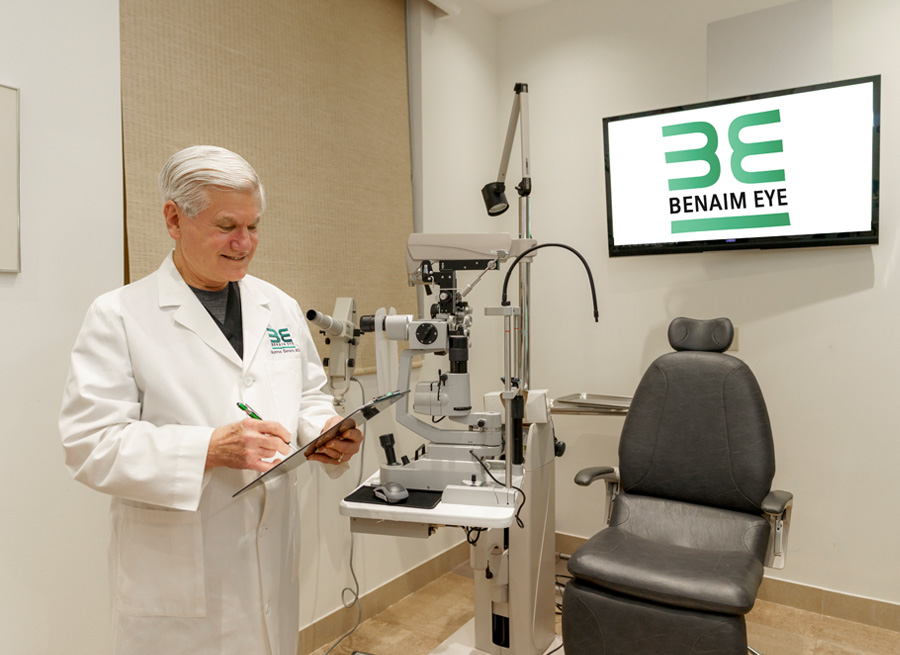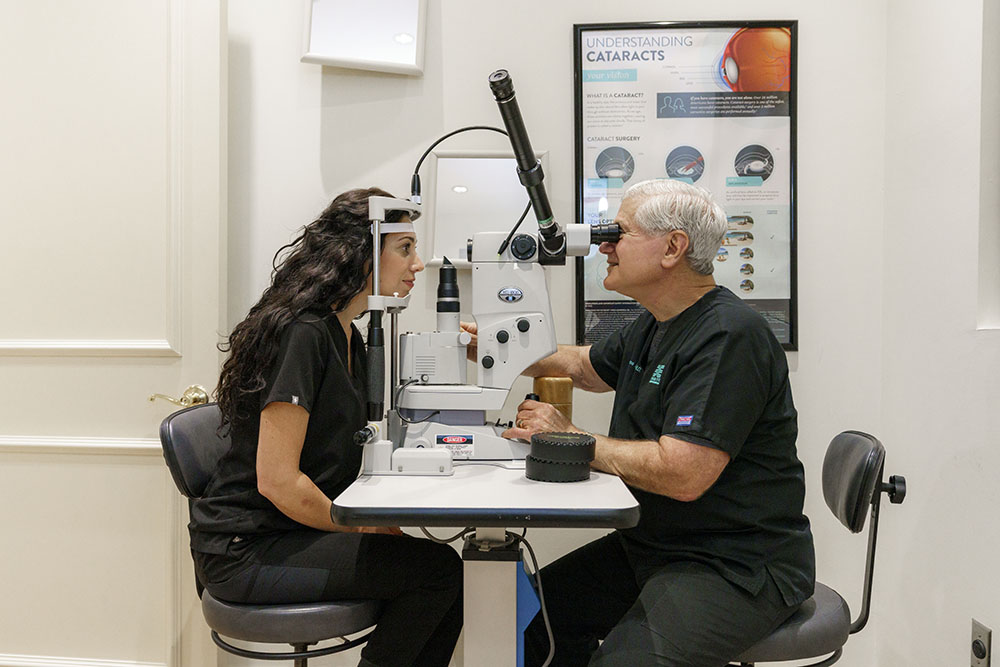 Eye exams can help you detect problems at their earliest — and most treatable — stage. Benaim Eye provides full-service eye care to its patients, starting with a comprehensive eye examination. Dr. Monroe Benaim, our local ophthalmologist, has been practicing for more than 25 years and he can help determine whether you need glasses or contact lenses, as well as check the overall health of your eyes.
Eye exams can help you detect problems at their earliest — and most treatable — stage. Benaim Eye provides full-service eye care to its patients, starting with a comprehensive eye examination. Dr. Monroe Benaim, our local ophthalmologist, has been practicing for more than 25 years and he can help determine whether you need glasses or contact lenses, as well as check the overall health of your eyes.
What to Expect from an Eye Exam
At the beginning of your appointment, you’ll briefly fill out paperwork, which will include questions about your medical history and any eye problems you may be experiencing.
During your appointment, you’ll receive a thorough examination, including:
-
- Glaucoma test — Measures the pressure inside your eyes.
- Stereopsis test — Tests your depth perception.
- Ocular motility test — Tests how well your eyes can follow a moving object or move between two separate objects.
- Visual acuity test — Tests how well you can read letters from a distance when you cover each eye.
- Refraction — Determines your prescription for contact lenses and / or glasses.
- Retina exam — Allows your ophthalmologist to evaluate the back of your eye, including the retina. During this test, the ophthalmologist will dilate your eyes, to have a clearer view of the retina.
 Comprehensive eye exams are critical to ensuring the health of your eyes over time and protecting your vision. They can help to catch early indicators of eye conditions, including glaucoma, cataracts, macular degeneration, cornea injuries, and dry eye disease.
Comprehensive eye exams are critical to ensuring the health of your eyes over time and protecting your vision. They can help to catch early indicators of eye conditions, including glaucoma, cataracts, macular degeneration, cornea injuries, and dry eye disease.
At the end of the eye exam, Dr. Benaim and his team will meet with you to discuss the results, provide recommendations, and give you a prescription for contacts or glasses, if needed.
Checklist: What to Bring to Your Eye Exam
There are a few things that you can bring to your comprehensive eye exam to ensure it goes smoothly.
Make sure to pack:
- Your current glasses and / or contact lenses
- Your current prescription (if you obtained it through a different provider) or your contact lens boxes
- List of any medications you may currently be taking
- Sunglasses, as your eyes may be light sensitive if they were dilated
By having these items on-hand for your next appointment, you’ll be able to speed up the process of getting your contact lenses or glasses.
Is It Covered By Insurance?
In many cases, annual eye exams are covered under your vision insurance. However, every insurance provider is different. For your own peace of mind, we recommend calling your provider and asking about your specific coverage before making an appointment.
There are also some services that may be done along with your comprehensive eye exam that fall outside of your insurance coverage. For example, refraction tests — where the ophthalmologist or medical assistant flips through from one lens to the next asking, “Better 1 or Better 2?” — are not typically covered and people generally pay a small out-of-pocket fee.
How Often Should I Get a Comprehensive Eye Exam?
The best way to ensure good, clear vision is through regular comprehensive exams. We recommend that contact wearers have an exam every year and that healthy adults have an exam every two years.
For those who are age 60 or older, a comprehensive eye exam is recommended every year. Finding and treating your eye conditions early will improve the likelihood of successful treatment.
To schedule a comprehensive eye examination, contact our office at 561-747-7777. Dr. Benaim and the staff at Benaim Eye are dedicated to helping Florida residents — and our out-of-town guests — see clearly!
 New Address:
New Address: